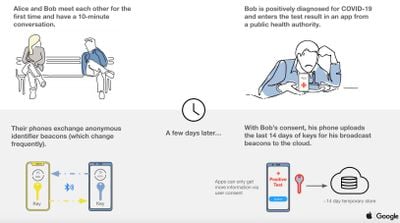Apple and Google developed their upcoming COVID-19 contact tracing tool in record time, according to a new report from CNBC that details how the two companies came together to create the API.

It took Apple under a month to flesh out the project, and in the beginning stages, it was the work of a handful of employees who had started brainstorming a solution to help prevent the spread of COVID-19 back in March.
The speed at which the tool was developed was "highly unusual" for Apple, according to CNBC, spearheaded by employees who wanted to create a decentralized contact tracing solution that used Bluetooth in the background, didn't draw much battery life, and was focused on privacy.
The initial team focused on an opt-in solution that would send anonymous alerts to other phones it had been nearby rather than uploading the information to a government or central authority to prevent databases with detailed location or proximity info from being built, which are all features of the finished product.
Time was of the essence given the quick spread of COVID-19, and it didn't take long for the project to pick up speed with engineers volunteering their time. Meanwhile, employees at Google were also working on something similar, and team members from both Apple and Google ultimately communicated with one another and found a solution for working together.
Within a few weeks, the Apple project - code-named "Bubble" - had dozens of employees working on it with executive-level support from two sponsors: Craig Federighi, a senior vice president of software engineering, and Jeff Williams, the company's chief operating officer and de-facto head of healthcare. By the end of the month, Google had officially come on board, and about a week later, the companies' two CEOs Tim Cook and Sundar Pichai met virtually to give their final vote of approval to the project.
Apple is said to be aiming to launch its contact tracing tool, now called exposure notification, on May 1 in a software update. Apps that use Apple's exposure notification API will run on the iPhone 6s and later and will be able to communicate not only with iPhones, but also with Android devices, with the goal of informing users if they've been exposed to COVID-19.
CNBC's full report, which goes much more into depth on the development of the partnership and the work on the tracing technology, can be found on CNBC's website.
























